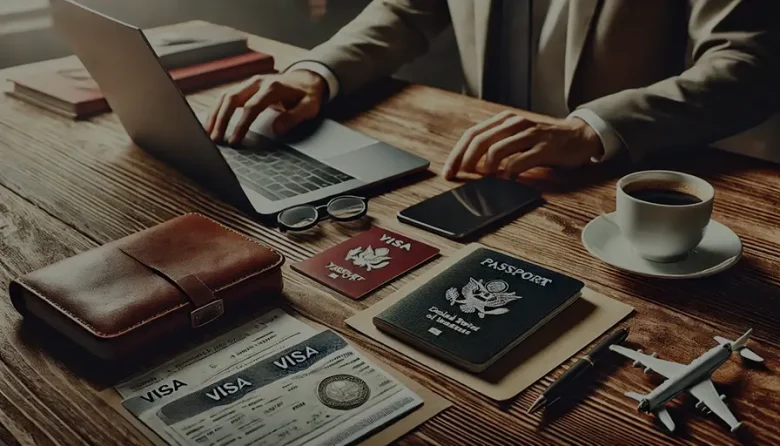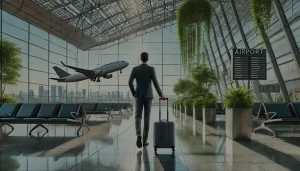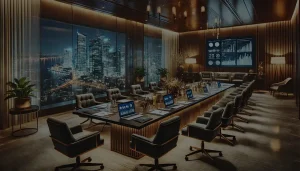Table of Contents
Issuing visas and documents for international business trips to major cities is an increasingly relevant topic in a world where globalization and international business require agility, precision and in-depth knowledge of bureaucratic procedures. In a scenario of constant regulatory changes and specific requirements for each destination, it is essential that executives and company managers are well informed and prepared to face the process of issuing visas and documents. This article explores each step of the procedure in detail, presenting practical examples and case studies that illustrate challenges and solutions adopted in large global centers.
Understanding the International Business Travel Landscape
What are Visas and Essential Documents?
For many professionals, obtaining visas and documents may seem like a bureaucratic process full of obstacles. However, it is important to understand that these documents are the gateway to doing business in international markets. Visas are authorizations granted by countries so that foreigners can enter and remain temporarily in their territory, while other documents, such as passports, work permits and letters of invitation, complement this process, ensuring that the traveler is legally authorized to perform his or her duties during his or her stay.
In the context of business travel, issuing visas takes on an even more strategic character. For example, the B-1 visa, used in the United States, allows businesspeople and executives participate in meetings, conferences and negotiations without the need to obtain a work permit, as long as there is no employment relationship with an American company. In destinations such as China, requirements may include the presentation of official invitations and proof of scheduled meetings, demonstrating the seriousness of the trip.
Differences between Business Travel and Tourism
Although the act of traveling involves a number of common preparations, corporate travel have specific requirements that clearly differentiate them from tourism. While tourists seek leisure and cultural experiences, business travelers need to prove the purpose of the trip and demonstrate that there are real commercial interests behind the trip.
In practical terms, this means that, in order to obtain a visa, the professional must present documents that prove that they are carrying out business activities, such as letters of invitation from partner companies, proof of meetings and, in some cases, contracts or service orders. For example, while a tourist traveling to Europe may only need a valid passport and travel insurance, an executive traveling to London to close business deals will need to prove the existence of a business agenda and, possibly, the relationship between the companies involved.
Research and Strategic Planning
Destination Identification and Local Requirements
The first step to a successful process is to thoroughly research your chosen destination. Each international metropolis has its own rules and requirements, and it is imperative to be familiar with these specificities before starting the issuance process. Cities such as New York, London, Dubai and Tokyo, for example, maintain strict policies regarding immigration and the entry of foreigners for business purposes.
When identifying a destination, it is recommended to consult the official websites of governments and embassies, which often provide detailed guides with a list of required documents, processing times and information on consular fees. This research step helps to avoid unpleasant surprises and allows the traveler to prepare in advance for legal and bureaucratic requirements.
Tools and Resources for Reference
To speed up your search, there are several tools and resources that can be used. Among them, official government portals stand out, such as the website of the United States Department of State, the British government portal or the information systems of the ministries of foreign affairs of several countries. In addition, consulates and embassies usually offer online support, where you can ask questions and obtain updated information about the process.
These resources are essential to ensure that the data obtained is accurate and in compliance with current regulations. For example, an executive who needs to travel to China can access the Chinese embassy website to check the necessary forms and list of complementary documents, avoiding delays or visa refusal due to outdated information.
Practical Considerations for Preparing Documentation
When preparing for the issuance of visas and documents, it is essential to gather all required paperwork and ensure that each is properly completed and authenticated, if necessary. Organization is a determining factor in the success of the process, as any error or omission can result in significant delays.
In addition to the basic documents, it is important to consider the need for certified translations, authentications and, in some cases, medical examinations. Professionals who have already gone through the process report that anticipating each step, such as obtaining translations or scheduling examinations, makes all the difference in the fluidity and efficiency of the procedure.
Step by Step Guide to Issuing Visas and Documents
Preparation of Necessary Documents
The initial stage of the process involves collecting and preparing essential documents. Common items include:
- Valid Passport: It must be valid for at least six months after the scheduled travel date.
- Completed Forms: Each country has its own visa application form, and filling it out correctly is crucial.
- Proof of Commercial Relationship: Documents such as invitation letters, contracts and meeting receipts are essential.
- Bank Statements and Financial Proofs: Used to demonstrate financial capacity to cover expenses during the stay.
- Travel Insurance: In some countries, purchasing travel insurance is mandatory.
Practical examples show that multinational companies usually keep an internal checklist to ensure that all documents are in order. For example, a large corporation based in São Paulo, when organizing a business trip to Europe, checked whether each employee had an up-to-date passport, whether the invitation letters were duly signed and whether the meeting receipts were attached to the documentation. This level of organization not only speeds up the process, but also minimizes the risk of unforeseen events.
Visa Scheduling and Application
Once the documents have been prepared, the next step is to schedule and apply for the visa. Many countries now offer online systems to facilitate this step. The applicant must access the official website of the embassy or consulate, fill out the application form and schedule a date to appear in person, if necessary.
During this process, it is important to pay attention to details such as:
- Please check that all information is correct before submitting the request;
- Choose the date and time with a margin that allows for unforeseen events;
- Note down the generated protocol number, as it will be used to track the status of the request.
Reports from professionals who have gone through the process show that using official portals makes the procedure more transparent and secure. In cases of travel to the United States, for example, scheduling a B-1 visa is done through the official website, where the candidate can monitor the status of the process and receive notifications about the need to present additional documents.
Interview at the Consulate/Embassy
The interview stage is often the most feared by travelers. However, with proper preparation, it can be carried out smoothly and efficiently. The interview aims to confirm the veracity of the information provided and assess the purpose of the trip.
Some important interview tips include:
- Bring all original documents and organized copies;
- Dress formally and appropriately for the environment corporate;
- Answer questions clearly, objectively and confidently;
- Be prepared to explain the importance of the trip and the expected results for the company.
In one case study, an executive who needed to travel to London reported that during the interview he was asked about the details of the meeting with British partners. His preparation, which included a detailed presentation of the business agenda, was essential to gain the trust of the consular officer and ensure the issuance of the visa.
Monitoring the Process and Deadlines
Even after the interview, ongoing monitoring of the process is essential. Most consulates offer online systems where applicants can check the progress of their application. This practice allows travelers to always be up to date on any pending issues or the need to submit additional documentation.
The timeframes vary depending on the country and the type of visa requested. While some countries process visas in just a few days, others can take weeks, which reinforces the importance of starting the process in advance. Professionals recommend that the application be made at least two to three months before the planned travel date, to ensure there is room for any setbacks.
Real Cases and Case Studies
Issuing a Visa for Business Travel to the USA
A notable example is the process of issuing a B-1 visa for business travel in the United States. A large technology company based in Brazil needed to send a team to participate in an important conference in San Francisco. The process involved meticulous preparation of documents, including invitation letters from the conference organizers. event, proof of participation in scheduled meetings and financial statements that demonstrated the company's solidity.
The appointment was made online, followed by an interview at the American consulate in São Paulo. During the interview, consular officers reviewed the details of the meeting, emphasizing the strategic importance of the trip for the company's business. The success of the process not only guaranteed the issuance of the visas, but also consolidated the company's reputation among international partners.
Process for Travel to Europe (Germany or United Kingdom)
Another illustrative case involves a Brazilian company that was looking to expand its operations in Europe. The company’s board of directors decided that a series of face-to-face meetings in Germany and the United Kingdom were essential to establish new partnerships. Preparation included obtaining documents proving the existence of contracts under negotiation, as well as issuing letters of invitation to interested European companies.
In the case of Germany, the process required the presentation of international travel insurance and proof of accommodation, while in the United Kingdom, the emphasis was placed on justifying the trip and demonstrating strong business ties. In both situations, strict monitoring of deadlines and ongoing communication with consular representations were crucial to the success of the processes.
Challenges in Issuing Documents for Asian Countries
Asian countries such as China and Japan have specific characteristics that can complicate visa applications. A case study involving a company looking to expand its operations in Asia revealed that, in addition to standard documents, it was necessary to present certified translations and letters of invitation issued by local partners. Bureaucracy and cultural differences posed additional challenges, requiring even more detailed preparation.
In the case of China, for example, the company needed organize a series of meetings previews that were formalized through official invitations, in addition to proving that the executives had a solid professional background. In Japan, the focus was on presenting a solid business history and precise information about the objectives of the trip. These examples highlight the importance of adapting to the specific requirements of each country and having specialized advice, when necessary.
Advanced Tips and Complementary Strategies
Specialized Consulting and Advisory
In an environment where bureaucracy can become a real obstacle, having the guidance of specialized consultants can represent a competitive advantage. Companies that invest in consultancy for issuing visas and documents notice a significant reduction in the problems faced during the process.
These consultancies often offer complete packages that include everything from organizing documents to monitoring the entire consular process. One example is a renowned immigration consultancy firm that has operated in several international markets, helping companies structure their travel processes efficiently and without surprises. The experience of these specialists adds security and transparency, which are essential factors for avoiding delays and complications.
Automation and Digital Tools
Technology has proven to be an indispensable ally in the management of bureaucratic processes. Digital tools that enable the organization and monitoring of documents, as well as the scheduling of interviews, have been widely adopted by companies operating on an international scale. Process management systems corporate travel, for example, allow the team responsible for the human resources department and the legal area to monitor the status of each request in real time.
These technological solutions not only speed up the process, but also reduce the margin for error by centralizing information and allowing detailed monitoring of deadlines. Reports from companies that have implemented these tools show a significant improvement in process efficiency and a reduction in operational costs associated with issuing visas.
Good Practices to Avoid Problems in the Process
To avoid unforeseen events, it is essential to adopt good practices that minimize risks during the document issuance process. Among the most common recommendations, the following stand out:
- Preparation of a Complete Checklist: Document each step of the process and confirm that all documents are correct and up to date.
- Careful Data Review: Carefully check all information filled in on the forms, avoiding errors that could compromise the analysis of the request.
- Advancement of Deadlines: Start the process well in advance, considering possible delays resulting from unforeseen bureaucratic issues.
- Active Communication with the Consulate: Maintain an open communication channel to clarify doubts and monitor the progress of the request.
These practices, when implemented systematically, ensure that the process occurs without surprises and that the traveler is always one step ahead of consular requirements.
Legal Aspects and Cultural Considerations
International Legislation and Regulations
The legal landscape of international travel is constantly evolving, with frequent changes in immigration rules and documentation requirements. Each country adopts specific policies that aim to ensure security and control of entry into its territory. Therefore, it is essential that travelers are aware of legislative changes and seek updated information through official sources.
For example, recent changes in US visa policy have led to stricter analysis of applications, requiring even more detailed documentation and proof of solid ties to the company of origin. In Europe, changes in regulations following international events have also imposed new requirements for the entry of foreign executives. In this sense, constantly updating information and monitoring legislative changes are essential practices to avoid unpleasant surprises.
Cultural Differences and Impact on the Issuance Process
In addition to bureaucratic issues, cultural aspects can also significantly influence the success of the visa and document issuance process. Each country has its own culture, which is reflected both in the way the processes are conducted and in the interaction during interviews at consulates.
For example, in countries like Japan, formality and respect for cultural norms are essential elements during the interview. The candidate's posture, way of communicating and even their choice of clothing may be evaluated more rigorously. On the other hand, in destinations like the United States, clarity and objectivity of answers are aspects valued by consular officers.
Understanding these cultural nuances can be the key to turning a potentially stressful interview into a successful step in the process. Executives who invest in intercultural training and seek to understand the expectations of each destination have a greater chance of successfully obtaining the necessary documents for their business trips.
Reflective and Motivating Closing
The process of issuing visas and documents for international business trips involves a series of steps that, when executed correctly, open the doors to opportunities in major global metropolises. From the meticulous preparation of documents to the strict monitoring of deadlines and adaptation to the cultural particularities of each destination, each phase of the process is crucial to the success of the journey.
In-depth knowledge and organization are essential allies in transforming bureaucratic challenges into strategic steps that culminate in safe, productive trips that boost business growth. Companies and professionals who dedicate themselves to understanding the nuances of international procedures not only avoid unexpected events, but also demonstrate a commitment to excellence, establishing a standard of seriousness and professionalism before partners and authorities.
Investing time and resources in preparing and organizing documents may seem, at first glance, like a daunting task. However, the experience accumulated by companies operating globally shows that this dedication translates into significant gains, both in terms of security and opportunities. business. Mastering bureaucratic processes, combined with a deep understanding of each country’s requirements, allows professionals to focus on what really matters: creating valuable connections and developing business strategies that transcend borders.
When reflecting on each step described in this article, it becomes clear that issuing visas and documents for business trips is not just a formality, but a strategic component that can define the success of international operations. The adoption of good practices, the use of technological tools and, when necessary, the support of specialized consultants, are measures that ensure a safer and more efficient process, minimizing risks and enhancing results.
So, when planning your next trip to an international metropolis, take into account every detail discussed here. Make sure your documentation complies with local requirements, strictly follow deadlines, and prepare to interact confidently and culturally appropriately during your interview at the consulate. These precautions will make all the difference, transforming a potentially complex process into a successful and enriching journey.
Each experience during the visa issuance process contributes to the construction of knowledge that can be applied in future trips and that strengthens your company's position in the global market. Therefore, investing in organization and preparation is not just a bureaucratic necessity, but a strategic step to broaden horizons and open new doors in an increasingly competitive and dynamic business scenario.

Cosmopolitan executive, business travel consultant and luxury hotel lover, Alexander Belmont shares exclusive insights into premium experiences in metropolises around the world.




